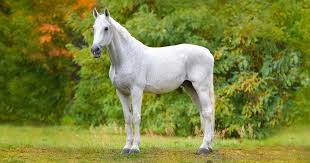
Holsteiner
Conditions of detention
Holsteiners thrive in environments where they have access to both stabling and open spaces for regular exercise. They require spacious, well-ventilated stables and ample turnout to maintain their physical and mental well-being.
Useful Fact: Holsteiners, being large and active horses, benefit from regular turnout in a pasture where they can move freely, which helps maintain their muscle tone and mental health.
Nutrition and diet
Holsteiners require a balanced diet rich in high-quality forage, such as hay, supplemented with grains and specific vitamins and minerals to support their athleticism. Their diet may need adjustment based on their level of activity, age, and individual metabolism.
Useful Fact: Due to their athletic nature, Holsteiners may require a diet higher in energy and protein, particularly if they are in heavy training or competition.
Health
Holsteiners are generally healthy and robust, but they can be prone to issues common among larger breeds, such as joint problems, particularly in their hocks and stifles. Regular veterinary care, including monitoring for signs of lameness and other joint-related issues, is crucial.
Useful Fact: Holsteiners often have long careers in sport, but maintaining their joint health through proper nutrition, regular exercise, and preventive veterinary care is key to their longevity.
Grooming and care
Regular grooming is essential for Holsteiners, particularly if they are in regular work or competition. Their coats should be brushed daily, and their hooves need to be checked and cleaned frequently to prevent issues such as thrush or cracks.
Useful Fact: Holsteiners tend to have strong, durable hooves, but regular farrier care is necessary to maintain hoof health, especially for those involved in high-impact sports like show jumping.
Education and training
Holsteiners are known for their intelligence and willingness to work, making them highly trainable. They excel in disciplines like show jumping, dressage, and eventing, where their powerful build and agility are highly valued.
Useful Fact: Holsteiners are often started in training at a young age, particularly in disciplines like jumping, where their natural ability can be honed early, but care should be taken to avoid overworking young joints.
Toys and entertainment
Holsteiners, like many intelligent and active horses, benefit from mental stimulation when not being ridden. Toys that encourage problem-solving, such as treat balls, or activities like ground work and lunging can keep them engaged.
Useful Fact: Incorporating variety into their routine, such as cross-training with different disciplines or incorporating fun activities like trail rides, can help keep a Holsteiner mentally stimulated and physically fit.
Safety
Given their size and strength, Holsteiners require secure, sturdy fencing to ensure their safety. Stabling and paddocks should be designed to minimize injury risks, with ample space for these large horses to move comfortably.
Useful Fact: Holsteiners are known for their calm and cooperative nature, but because of their size, handlers should always practice safety precautions when working with them to prevent accidents.
Accessories
Holsteiners, being performance horses, often require specialized tack suited to their discipline. This includes well-fitted saddles, bridles, and protective leg gear, especially for jumping or dressage. Custom-fitted equipment is often necessary due to their large, muscular build.
Useful Fact: Using properly fitted tack is crucial for Holsteiners to prevent discomfort or injury, especially during intense physical activities like show jumping.
Socialization
Holsteiners are social animals that enjoy regular interaction with other horses and humans. They thrive in a herd environment and benefit from companionship, which helps prevent boredom and associated behavioral issues.
Useful Fact: Holsteiners are known for their good temperament, making them suitable for both competitive riders and those looking for a reliable, friendly horse for various equestrian activities.
Travel and Transportation
Holsteiners generally travel well but require a spacious, well-ventilated trailer due to their size. Regular stops during long trips for water, rest, and stretching are important to keep them comfortable and healthy.
Useful Fact: Holsteiners’ calm nature often makes them good travelers, but ensuring they are accustomed to the trailer and travel routine can reduce stress and make transportation smoother.
Behavior and psychology
Holsteiners are known for their balanced temperament. They are typically calm, cooperative, and eager to work, which makes them excellent in both competitive and leisure settings. Their intelligence and willingness to learn make them a favorite among riders and trainers.
Useful Fact: Holsteiners’ combination of calmness and athleticism makes them particularly suited to high-level competition, where their focus and trainability are major assets.
Legal aspects
Owning a Holsteiner may involve specific legal considerations, especially regarding breeding and competition. Registration with the Holsteiner Verband or relevant national breed associations is necessary for breeding and participating in official events. Compliance with animal welfare laws and competition regulations is essential.
Useful Fact: Holsteiners are often bred and registered with strict pedigree requirements to maintain the breed’s high standards, and this lineage tracking is important for maintaining the breed’s reputation in sport.


